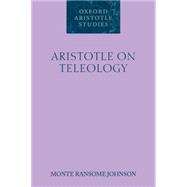
Aristotle on Teleology
by Johnson, Monte RansomeBuy New
Rent Textbook
Rent Digital
Used Textbook
We're Sorry
Sold Out
How Marketplace Works:
- This item is offered by an independent seller and not shipped from our warehouse
- Item details like edition and cover design may differ from our description; see seller's comments before ordering.
- Sellers much confirm and ship within two business days; otherwise, the order will be cancelled and refunded.
- Marketplace purchases cannot be returned to eCampus.com. Contact the seller directly for inquiries; if no response within two days, contact customer service.
- Additional shipping costs apply to Marketplace purchases. Review shipping costs at checkout.
Summary
Author Biography
Monte Ransome Johnson is professor at Saint Louis University, Missouri
Table of Contents
| List of Tables | p. ix |
| Abbreviations | p. x |
| Introduction | p. 1 |
| Teleology as a Critical Explanatory Framework | |
| Historical Background to the Interpretation of Aristotle's Teleology | p. 15 |
| Greek, Arabic, and Latin commentary | p. 16 |
| Scholasticism and the scientific revolution | p. 23 |
| Natural theology and the critique of teleology | p. 30 |
| Theophrastus and teleological aporiai | p. 35 |
| Preliminary Study of Aristotle's Causes | p. 40 |
| Responsibility, blame, and cause | p. 40 |
| The four kinds of causes | p. 42 |
| Knowledge, demonstration, and causal explanation | p. 49 |
| Demonstration through 'the cause for the sake of which' | p. 52 |
| Temporal priority | p. 56 |
| Integrating causal explanations | p. 56 |
| Explanatory and non-explanatory causes | p. 59 |
| Teleological Notions | p. 64 |
| The cause for the sake of which | p. 64 |
| Nothing in vain | p. 80 |
| End, limit, and the complete | p. 82 |
| Function, activity, and the thing in a state of completion | p. 85 |
| Axiological terminology: the good, fine, etc. | p. 90 |
| Teleological Dialectic | p. 94 |
| Luck (Empedocles) | p. 95 |
| Necessity and Spontaneity (Democritus) | p. 104 |
| Intelligence (Anaxagoras and Diogenes of Apollonia) | p. 112 |
| God (Xenophon, Socrates) | p. 115 |
| Form (Plato) | p. 118 |
| Teleological Explanations in Natural Science | |
| Teleology and Elements | p. 131 |
| Natural change and motion | p. 132 |
| Celestial elemental locomotion | p. 136 |
| Terrestrial elemental locomotion | p. 140 |
| Elemental transmutation | p. 145 |
| Meteorology | p. 149 |
| Teleology and Organisms i: General Principles | p. 159 |
| Reasoning from phenomenal effects to explanatory causes | p. 160 |
| Genetic order and explanatory order | p. 165 |
| Survival and reproduction as the basis of explanation in the life sciences | p. 171 |
| The insufficiency of necessity alone to account for living natures | p. 178 |
| Mechanism, reduction, and heuristic | p. 182 |
| Teleology and Organisms ii: Specific Explanations | p. 188 |
| Normal Cases | p. 188 |
| Abnormal cases | p. 198 |
| Animal behavior | p. 204 |
| Teleology and Humans | p. 211 |
| Deliberation, intention, art, and science | p. 212 |
| Ultimate ends of humans | p. 217 |
| Different ends of humans and other organisms | p. 222 |
| The use of other living things as instruments | p. 229 |
| Social organisms and organizations | p. 237 |
| Teleology and the Cosmos | p. 247 |
| The primary cause of natural motion | p. 248 |
| The most general teleological explanation of motion | p. 253 |
| No 'teleological' proof for the existence of god in Aristotle | p. 258 |
| Locomotion as the paradigm of change for the sake of something | p. 263 |
| A final aporia: how does the good exist in the universe? | p. 271 |
| Conclusion | p. 287 |
| Bibliography | p. 295 |
| Index of Texts and Commentaries | p. 311 |
| Index of Names | p. 321 |
| Index of Subjects | p. 325 |
| Table of Contents provided by Ingram. All Rights Reserved. |
An electronic version of this book is available through VitalSource.
This book is viewable on PC, Mac, iPhone, iPad, iPod Touch, and most smartphones.
By purchasing, you will be able to view this book online, as well as download it, for the chosen number of days.
Digital License
You are licensing a digital product for a set duration. Durations are set forth in the product description, with "Lifetime" typically meaning five (5) years of online access and permanent download to a supported device. All licenses are non-transferable.
More details can be found here.
A downloadable version of this book is available through the eCampus Reader or compatible Adobe readers.
Applications are available on iOS, Android, PC, Mac, and Windows Mobile platforms.
Please view the compatibility matrix prior to purchase.
